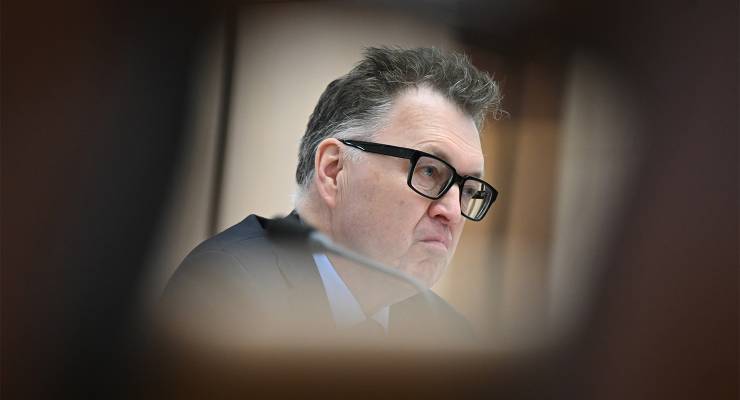
One of the gatekeepers of the report that PwC International is refusing to hand over to authorities works at PwC Australia in Sydney alongside CEO Kevin Burrowes — and has herself faced action over the tax leaks scandal.
Patricia “Paddy” Carney is not only a director of UK-based PricewaterhouseCoopers International Limited — and so is legally entitled to all its documents — but is also one of PwC Australia’s top executives.
Carney sits on PwC Australia’s board, which has just nine members — including Burrowes — and is the “oversight body for PwC Australia”.
“Paddy is a senior partner of PwC Australia, a member of the global board of the PwC International network and a member of the PwC Australia board of partners,” states her LinkedIn bio.
She has been a “member of the global board of the US$53b PwC International network” since “April 2017”, it states.
PwC’s global operations commissioned law firm Linklaters to examine international aspects of the tax leaks scandal, yet PwC is refusing to hand over the report to authorities.
Is PwC ‘deliberately hiding’ the Linklaters report?
PwC Australia CEO Burrowes — whom PwC global parachuted into the role after the tax scandal broke — earlier this month told the Senate inquiry into consultancies he can’t hand over the Linklaters report because PwC International won’t give it to him.
“I’ve sent emails and requests to PwC International Limited, and on the basis of confidential legal advice they highlighted to me that they would not make it available to me,” Burrowes told the inquiry on February 9.
“I do not have the report.”
Under legal “professional privilege”, communications between a lawyer and their client can be kept confidential. PwC is claiming the report is confidential because it constitutes “advice” from its “lawyer”, Linklaters.
The inquiry chair, Liberal Senator Richard Colbeck, told Burrowes that PwC was treating the inquiry — comprising members of each of Australia’s major political parties — with “disrespect” and that the inquiry was “deadly serious” about obtaining the report.
“I don’t differentiate between you as PwC Australia and PwC as an organisation,” Colbeck said.
“If we don’t see the report, it ain’t going to be pretty”.
The inquiry heard the Australian Tax Office (ATO) and fellow federal agency the Tax Practitioners Board (TPB) have also not been given the report, which was completed by at least September 27 last year.
“We have asked for the report formally, and the response we got was that PwC Australia don’t have a copy and are not able to give it to us,” said TPB chair Peter de Cure.
ATO second commissioner Jeremy Hirschhorn said PwC was “deliberately hiding” the Linklaters report, using the “difference between their local firm and the international firm”, which are different legal entities.
A strategy of ‘plausible deniability’
The Linklaters report contains the names of at least half a dozen PwC officials internationally, dubbed a “dirty six” by the Senate inquiry into consultancies.
Since the scandal broke in January last year PwC has aggressively fought to keep the scandal confined to Australia.
That’s despite a 144-page cache of heavily redacted internal PwC emails from 2014-18 showing the involvement of PwC officials around the world.
PwC Australia took secret Australian government tax data — obtained while providing advice on new laws to prevent multinationals from avoiding tax — and used it to tout for business from multinationals seeking to avoid Australian tax.
Corporate governance expert Dr Andrew Schmulow, an associate professor at the University of Wollongong, told Crikey/The Klaxon that Burrowes’ claims appeared to be “part of a strategy”.
“Far from being an anonymous PO Box in a galaxy far, far away, this is a master entity, whose directors include an Australian partner — a partner under the authority of Kevin Burrowes, the CEO,” Schmulow said.
“The notion, therefore, that Burrowes himself can’t get hold of the report would be absurd if you didn’t realise that this excuse is part of a strategy: plausible deniability.”
Both Burrowes and Carney refused to comment when contacted by Crikey/The Klaxon.
Carney’s CV
UK regulatory filings state Carney is a “tax specialist” and has been a director of PwC International at all times since April 28, 2017.
PwC International has 20 current directors. Carney is the only director listed as residing in Australia.
“PwC is the brand under which the member firms of PricewaterhouseCoopers International Limited (PwCIL) operate,” says the group’s website.
“Together these firms form the PwC network. ‘PwC’ is often used to refer either to individual firms within the PwC network or to several or all of them collectively,” it states.
Carney’s LinkedIn bio states she is a “senior partner of PwC Australia”, a “member of the global board of the PwC International network” and a “member of the PwC Australia board of partners”.
The board overseeing PwC Australia is also called its “board of partners” or “governance board” and comprises a “maximum of ten partners”, including PwC Australia’s chair and CEO.
Last year Carney “stood down” as chair of the “risk committee” of the PwC Australia board over the tax scandal, but she remains on the board itself.
On May 29 PwC Australia announced it had “directed nine partners to go on leave, effective immediately”, pending its investigations.
“In addition, the chairs of the governance board and [of] its designated risk committee have decided to step down from their respective roles,” PwC Australia said.
The PwC Australia chair was Tracey Kennair. She departed the board and was replaced as chair by Justin Carroll.
Carney has been with PwC for 32 years and it was her “second term on the global board” of PwC, her LinkedIn bio states.
She is currently a board member of SCECGS Redlands, an exclusive private school on Sydney’s lower north shore, and a director of Sydney Festival.
Who’s been asked to hand over the report?
When phoned by Crikey/The Klaxon last week, Carney would not answer questions and instead directed us to PwC Australia’s public relations department.
At the February 8 hearing, Burrowes said he had “sent emails and requests” to “PwC International Limited” but did not say who he approached.
Burrowes refused to answer a series of written questions from Crikey/The Klaxon, including who at PwC International he had approached and whether he had asked Carney for a copy of the Linklaters report — and if not, why not.
Instead, in response to questions put to both Carney and Burrowes, PwC Australia head of media and reputation Patrick Lane responded: “The matter was discussed at length in the inquiry on Friday and we would refer you to those exchanges.”
Burrowes made no mention of any PwC Australia employees having access to the Linklaters report at the hearing, and Carney’s name was not mentioned at all.
In May last year, following months of pressure over the tax scandal, PwC Australia announced it had appointed private businessman Ziggy Switkowski to conduct an “independent review”.
As revealed by The Klaxon, PwC Australia refused to disclose the “terms of reference”, or instructions, it had set Switkowski.
A NSW Senate inquiry later forced the disclosure, revealing PwC had only tasked Switkowski with investigating matters from the date of his appointment — and so none of the tax leaks affair.
PwC released the sham report on September 27 last year. That same day PwC Global posted online a one-page statement stating the “PwC Network” had in May engaged Linklaters to examine PwC Australia sharing confidential information “with PwC personnel outside of Australia”.
“The review found that six individuals should have raised questions as to whether the information was confidential,” the statement said.
“To the extent that they are still with PwC, their firms have taken appropriate action,” it said, providing no further details.
Last week TPB chief executive Michael O’Neill told a Senate estimates hearing those claims were “not consistent with our reading of the emails”.
The matter was “much broader” than six people, O’Neill said.
The Senate inquiry into consultancies holds its next hearing tomorrow.








“Profits without Conscience”
Lol. Don’t you love it when capitalists undermine capitalism?
… If it wasn’t so de rigueur mundane .
It’s a lovely world we live in isn’t it!!
All the partners should be charged with something like conspiracy to defraud the Commonwealth. I am sure that will get them cooperating quick smart. Unfortunately, all they will get and have got is a smack with a damp lettuce leaf.
I doubt very much such a charge would get any cooperation. Far more likely it would get a high-powered team of lawyers, way more skilled than any the Commonwealth has or is willing to pay for, making the Commonwealth look a bunch of fools before the case gets dismissed with costs against the Commonwealth.
The only credible legal issue is breach of the non-disclosure agreement, which AFAIK is a contract and therefore a civil matter. I’m not convinced the government would really want to go there anyway. How embarrassing could it get for the government to have to explain, in open court, its reasons for inviting a company to join in the government’s plans for tax reforms when that company’s business, as everyone knows, is selling tax-dodging schemes? It seems to me perfectly natural that the PwC people in the room would assume the government must want them to use the tax reform information for their own benefit because there’s no other credible explanation for them being there; the NDA was just a meaningless formality.
“How embarrassing could it get for the government to have to explain, in open court, its reasons for inviting a company to join in the government’s plans for tax reforms when that company’s business, as everyone knows, is selling tax-dodging schemes?”
Actually, this happens all the time, including for years before 2015. Usually the process involves fine tuning draft legislation and trying to tease out unintended consequences. If done properly and in good faith, it’s a valuable process for any new legislation.
Yes, I know it happens here all the time – and in other places such as the UK too. Vested interests (who cultivate the major parties and ministers to ensure their access) are invited in while legislation is being drafted so they can protect themselves, insert new opportunities for profit and check that the government does their bidding. Or, as you put it, ‘Usually the process involves fine tuning draft legislation and trying to tease out unintended consequences,‘ which amounts to the same thing.
Instead of inviting professional tax dodgers to advise on tax reforms, why not invite those who depend on the services funded by tax revenue to help design the tax system? The current practice is as clever as a bank inviting professional bank robbers to help design the vaults and security systems on a new bank building, while paying no attention to those whose savings are at risk if the bank is robbed. It’s scandalous, and the fact it happens all the time only makes it much worse.
Back in the day us Public Servants were threatened with the Official Secrets Act (as amended) said threat had the ride “7 years”.
Simple surely. You hand over the report or you never get a single government contract again ever, or any affiliated company. Then we will see if we can remove you from anything else you do
That is certainly possible. But the International firm don’t get much/ anything out of the Australian business so they might not care.
On present performance they are unlikely to, are they?
“Just ignore it for long enough and the show should roll on!”
Ha Ha Ha!
Australia you have just been served a bucket load of Horses Poo.
“Now be nice and eat up the warm greens as they are good for you and my bottom line too.”
Yep the next bucket will be brown and in pats.
PWC needs to hire better PR people, as the CEO obviously has lost the trust of his executives.